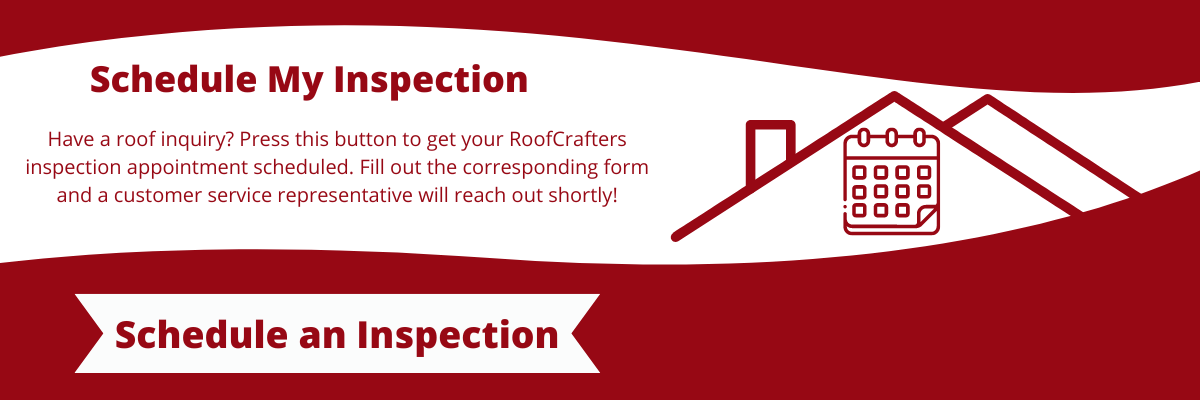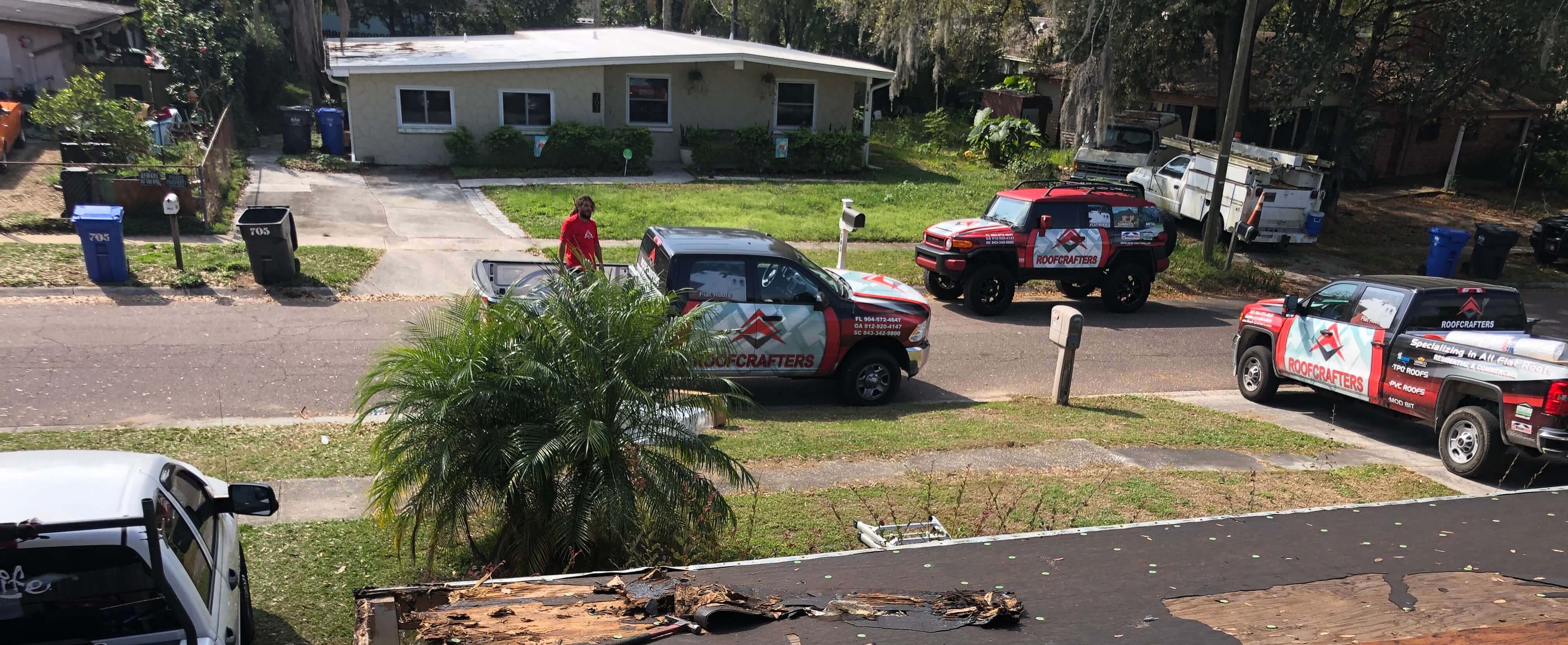
Discovering you have a roof leak oftentimes causes sheer anxiety. Seeing the leak is one thing, but what if it’s like the iceberg that sunk the Titanic where only a small part of it is visible to the naked eye, and the rest of its wretchedness lurks somewhere beneath the surface? Well, we hate to be the bearers of bad news here, but that’s almost always the case.
Don’t panic just yet, it sounds a lot scarier than it is, we promise. The experts at RoofCrafters have been repairing roof leaks since the first time The Titanic graced the big screen in ‘97, so we know a thing or two about these nasty beasts.
All of this being said, it’s probably safe to say that if you’re reading this blog post, you’ve probably stumbled across a leak and you’re wondering what exactly comes along with it. You’re in the right place because in this article you’ll learn what to do if your roof is leaking, why your roof may be leaking, and what can potentially happen when your roof leaks. So, let’s jump right in!
What Should I Do If My Roof Is Leaking?
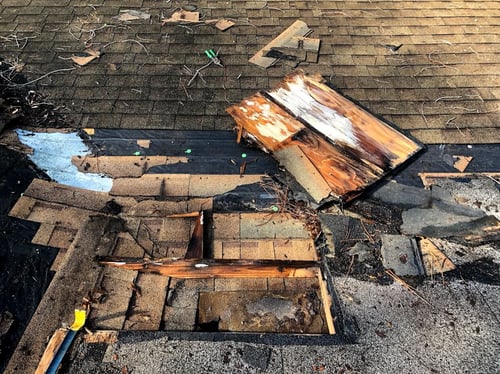
The first thing to do is to find ways to save your belongings when your roof leaks. Make sure that you move everything to a safe place away from any water. As a homeowner, you're responsible for protecting your home and preventing any further water intrusion, per your insurance policy. After you’ve relocated your belongings, call a contractor for an inspection where they'll most likely temporarily tarp or repair the roof to prevent any more water from entering your house.
Why Is My Roof Leaking?
There could be several reasons that cause your roof to leak. Some of the most common reasons include:
Lack of Maintenance
One of the most avoidable causes is lack of maintenance. While your roof is incredibly durable, it faces harsh climatic elements that cause it to wear out. Yearly inspections from a reputable roofing contractor can mitigate issues arising from a lack of maintenance. On top of this, you should visually inspect your roof frequently to ensure that nothing is obviously wrong, and if you notice something, call a roofing contractor promptly.
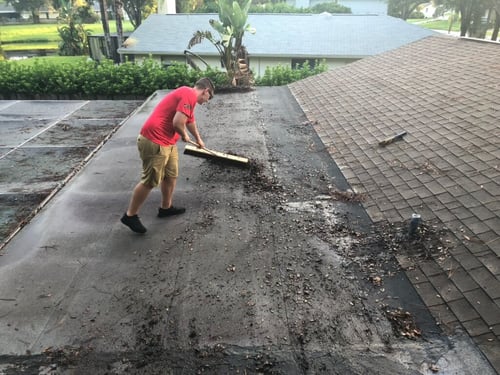
Ensure that your gutters aren’t rusted or clogged, your chimney and chimney flashing is in good condition, and the vents aren’t dry rotted, cracked, or damaged in any way that would allow water to get inside your home.
Weather Conditions
Harsh weather conditions can also cause your roof to leak. If your house has skylights, conduct inspections to check for leaks regularly. Roof leaks that occur during heavy storms and horizontal wind-driven rain indicate that your contractor may have installed your roof improperly.
Age
Everything has a useful life after which you should recycle it. Roofs are no different and generally, you should be planning to replace an asphalt shingle roof at 20 years. Premium roofs may last longer, however, it’s always better to replace them when you can, not when you should.
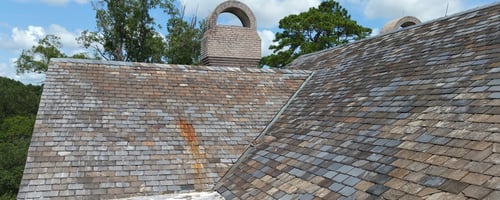
Always replace your roof when it’s near the end of its expected lifespan. While a well-maintained roof may last longer, an old roof has a greater likelihood of leaking and incurring more maintenance costs in the future.
So, What Happens When a Roof Leaks?
Roof leaks aren’t usually as dramatic as pop culture shows them. In the most extreme situations, leaky roofs might require you to place a bucket to collect the stream of water flowing from the roof. In most cases, a leaky roof only shows mild signs of water damage on the ceiling or walls.
Here’s what happens when a roof leaks:
Mold Growth
Algae and mold grow wherever there is moisture and heat. Not only does mold aggravate allergies, but it is also dangerous for your home. Any area with a lot of moisture and no sunlight is the perfect place for mold to grow, making roof leaks ideal for it.
Some signs of mold growth are:
- A musty smell in the house
- Cracking and peeling of the wall
- Stains on the ceiling
Among one of the most common signs of roof leaks is a stained ceiling. Usually, a discolored region is spotted on the roof, and if left untreated, it eventually damages the paint and the texture of the area. Contact a roofer if you see strange stains on the ceiling to have it looked at, remember the stains could be condensation from your ac unit or a plumbing pipe leaking. It’s not always a roof leak!
Damp Pipes
Any damp pipes that are supposed to be dry indicate a roof leak. Observe the pipes around your house for moisture. If you find any, it’s a sign that water might be leaking through your roof, and you should contact a roofer to fix it.
Intermittent Leaks
Some leaks come and go at certain times. While they might seem like something you can ignore, intermittent leaks are a sign of improper roof installation, and you should address them immediately to prevent other damage to your house.
Is a Leaky Roof Dangerous?
Without a doubt, a leaky roof is dangerous for anyone in the home, objects included. Water seeping in can short out electrical wiring and cause fires or lead to electrocution. In extreme situations, water from the leak may drip into the house as a stream and cause flooding and damage your electronics, clothing, and furniture.
While an intermittent or small leak might seem like something you can ignore, it is quite the contrary. When a roof leaks, water starts building up inside the house’s structure and causes it to weaken or rot over time.
The moment you suspect a leak, call a contractor to have your roof inspected. Doing so can save you a lot of money, considering you won’t be eligible for an insurance claim without diligent maintenance. Not fixing the damage also results in more rapid deterioration of the roof, which means that you’ll have to pay for a new one sooner.
Should I Fix My Roof Leak?
Yes, please! For the sake of your home and roof’s infrastructure, be sure to get that roof leak inspected and repaired as soon as you come across it. If not for those reasons, at least do it to protect all of your precious belongings and décor. Grandpa’s hand-carved chess set is one of a kind, you know.
As you now know, roof leaks are detrimental for various reasons. They can cause structural damage to the foundation of a building, compromising its stability and requiring costly repairs. Additionally, roof leaks can damage personal belongings, leading to financial loss and emotional distress. The presence of water can create an environment conducive to mold and mildew growth, posing health hazards to occupants, particularly those with respiratory conditions. However, with a little elbow grease and professional willpower, anything is fixable!
Now that your heart rate’s back to normal and you’re probably less sweaty than when you started reading this article, you can see that roof leaks aren’t worth panicking over. Yes, it’s important you get them fixed promptly, but there’s no need to stress over them. For an honest and informed experience regarding your roof's leak, schedule an inspection with RoofCrafters.
My name is David Toth and I am the lead estimator in North Florida with RoofCrafters Roofing. Originally from New Brunswick, I have called Florida home for the past 47 years. I enjoy cooking along with traveling to different historical areas in Florida when I have free time.



